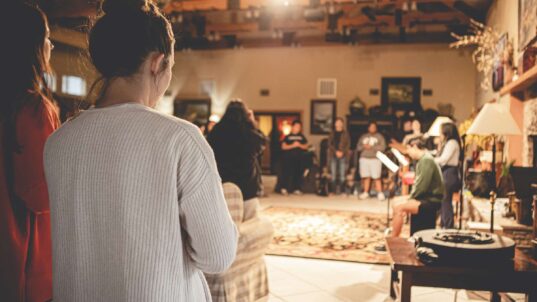The IF discussions did not end when class time was over. I began to view my other classes as a large-scale IF discussion…I noticed that I was voicing my thoughts more than I had ever done before in an academic setting
—Wesleyan First-Year Student
What if first-year students learned how to lead class discussions teams to develop diverse perspectives on the course material? That’s what first-year students at Wesleyan College in Macon, Georgia did in WISe 101, a seminar reinvented through a partnership with the Interactivity Foundation. This past August marked the start of the second-run of this innovative course at the small liberal arts women’s college. The entire first-year class of 115 or so students will devote a third of their class time to “IF Discussion Fridays”—student-facilitated small group discussions. In those IF Discussions the students rotate facilitator duties as they help each other to articulate contrasting ways to understand the week’s texts and presentations.
Also, the IF process was extremely helpful because being a part of that allowed me to see things from different perspectives and open my mind up to many topics I never had thought of before. By creating different viewpoints, I was able to not only grow as a college student but as a person as well
—Wesleyan First-Year Student
What do students gain from the course? Last year’s students talked about the value of gaining a practical communication skill, and learning how to facilitate a discussion group of their peers. This was no small task, since the groups were charged with a non-routine and open-ended task. Student interviewees commented that they learned something new in each class discussion. This was a departure from their prior experiences, where discussions were typically occasions to reinforce their previously held views rather than learn from their classmates. Students said they learned more together in their team than they would have independently. Interestingly, students also reported gaining a new appreciation for the work faculty members constantly do as they facilitate student learning in their courses.
The faculty members and several upper-class peer mentors noted similar results. They were impressed how quickly this class of students bonded, and did so across typical boundary lines. They noted that students all contributed. Even typically quiet or introverted students spoke up. Faculty members indicated that the student-facilitated discussions stayed on topic and went deep into the subject matter, in contrast to many prior experiences with student discussion sessions. They also were impressed with how positively students dealt with differences that emerged in the discussion sessions.
WISe 101 is the first semester of a two-semester required first-year seminar (the Wesleyan Integrated Seminar Experience). Working with support from the Interactivity Foundation, Wesleyan College professors Dr. Matt Martin and Dr. Deidra Donmoyer convened a team of ten other faculty members to redesign the course throughout the spring of 2012.
In June 2012 IF Vice-President Dr. Jeff Prudhomme, IF Fellow Ieva Notturno, and Hollins University professor Dr. Michael Gettings co-directed a weeklong Summer Institute where the faculty practiced the discussion process that the students would use in the class. Faculty also learned how to instruct students to facilitate exploratory discussions and to be productive discussion participants. Each IF discussion session was designed as an occasion for students to draw in ideas from the common sessions, course texts, and writing assignments. In these sessions students are explicitly charged with exploring divergent understandings of those ideas.
In the fall of 2012 the faculty members divided their classes into three discussion teams. The teams were mixed in terms of students’ academic backgrounds, comfort levels for speaking in public, ethnicities, and nationality (most groups had an international student). Students rotated facilitation responsibilities from week to week, with each student facilitating twice. This provided an opportunity for students to improve their performance based on faculty feedback. Student facilitators were responsible for developing a facilitation plan. Their facilitation would aim at helping their team explore diverse perspectives without directing the team to predetermined results of the facilitator’s choosing. Facilitators were also responsible for drafting notes summarizing the content of their team’s discussion. The faculty member met with each facilitator to preview the facilitation plan and to review their performance, offering guidance on how to improve.
Overall the students and faculty were very happy with their experiences with the 2012 version of WISe 101. They hope to see the same positive impact from the new class that ran in the fall of 2013.
I have gained so much knowledge through the discussions we would have every Friday. And by no means am I saying that to put on a “goody-goody” facade. I say it because I am not the only one from my section of that opinion. Every woman in the classroom has openly confessed that she learned more from our WISe class and the IF groups than any other class, and actually enjoyed the process. To have an entire class state that they wish they could be in the class again, truly is a rare statement to be made. It is a statement that can and will inspire.
—Wesleyan First-Year Student




